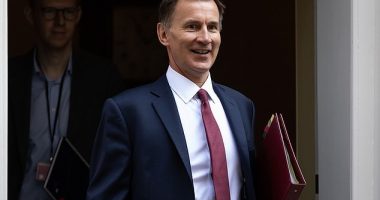
The Government has bowed to intense pressure to clamp down on tech giants raking in money from scam advertisers in its new online safety law.
It is a victory for industry and consumer groups, politicians and regulators who have long demanded action against harmful advertising, which lures unsuspecting savers and investors to hand over cash to fraudsters touting fake or cloned deals and products.
After resisting calls for action for more than a year, the Government announced a new legal duty in a forthcoming bill that will force the largest and most popular social media platforms and search engines to prevent paid-for fraudulent adverts appearing on their services.


Intense pressure: The finance industry and consumer groups, politicians and regulators have long demanded action against paid-for scam ads on top internet and social media sites
‘The change will improve protections for internet users from the potentially devastating impact of fake ads, including where criminals impersonate celebrities or companies to steal people’s personal data, peddle dodgy financial investments or break into bank accounts,’ says the Department for Digital, Culture, Media & Sport.
‘Separately, the government is launching a consultation on proposals to tighten the rules for the online advertising industry.
‘This would bring more of the major players involved under regulation and create a more transparent, accountable and safer ad market.’
The Financial Conduct Authority had backed MPs, the finance industry and crime experts in raising the alarm about soaring cases of sophisticated fraudsters ‘cloning’ their legitimate operations and products to steal people’s cash.
The regulator, which at one point threatened to take legal action against Google if it didn’t do more to tackle online fraud, has now welcomed news the Online Safety Bill will require the largest platforms to tackle fraudulent advertising.
Mark Steward, executive director of enforcement and market oversight, says: ‘We have been clear about the need for legislation and appreciate the Government’s positive engagement on this.
‘We look forward to working closely with the Government and regulatory partners as they finalise and implement the details of the draft bill.’
The Government has also faced pressure from celebrities, such as Martin Lewis, whose names and images were touted in fraudulent adverts to fool unsuspecting customers that financial products were legitimate and reputable.
Lewis, founder of MoneySavingExpert and the Money and Mental Health Policy Institute, says now: ‘I am thankful the Government has listened to me and the huge numbers of other campaigners – across banks, insurers, consumer groups, charities, police and regulators – who’ve been desperate to ensure scam adverts are covered by the Online Safety Bill.
‘We are amidst an epidemic of scam adverts. Scams don’t just destroy people’s finances – they hit their self-esteem, mental health and even leave some considering taking their own lives.
‘Now we and others need to analyse all elements of this new part of the Bill, and work with Government and Parliament to close down the hiding places or gaps scammers can exploit.’
Culture Secretary Nadine Dorries says: ‘We want to protect people from online scams and have heard the calls to strengthen our new internet safety laws.
‘These changes to the upcoming Online Safety bill will help stop fraudsters conning people out of their hard-earned cash using fake online adverts.
‘As technology revolutionises more and more of our lives the law must keep up. Today we are also announcing a review of the wider rules around online advertising to make sure industry practices are accountable, transparent and ethical – so people can trust what they see advertised and know fact from fiction.’
A coalition of 14 consumer groups, charities and industry bodies had called on the Government to change the ‘flawed’ bill.
The coalition spanned industry bodies like UK Finance, the Investment Association and the Association of British Insurers, groups like Victim Support, Age UK and Which?, and James Thomson, chair of the City of London Police Authority Board.
What do the tech and online advertising industries say?
Tech UK, the trade body for the UK tech industry, declined to comment until the new version of the bill is published. Its previous response on the issue can be found here.
Jon Mew, chief executive of the industry body for digital advertising IAB UK, says it welcomes the opportunity to contribute to a future regulatory framework for digital advertising – the Online Advertising Programme – through an evidence-led process that builds on the strong industry standards already in place.
‘Together with government, regulators and law enforcement bodies, the UK digital advertising industry wants to play its part in restricting, detecting and disrupting scam ads,’ he went on.
‘However, the regulatory coherence that we believe the OAP can deliver on this and other issues is undermined by provisions on “fraudulent advertising” being added to the Online Safety Bill.
‘The decision to duplicate the focus on scam ads across both programmes creates unnecessary regulatory fragmentation and risks constraining proper policy development.
‘To announce legislative changes on the same day as launching such a wide-ranging consultation on the sector undermines the purpose of the OAP and could pre-empt its outcomes.
‘The Government has said that the OAP will aim to holistically review digital ad regulation and consider a range of potential policy responses. Today’s announcement makes that process more difficult.
‘We are also concerned that the widened scope of the OSB has not been subject to industry consultation and that it could have unintended consequences for legitimate advertisers – particularly small businesses – if it is applied across the board.
‘The approach set out today seems at odds with the principles set out in the Government’s Plan for Digital Regulation, which emphasises the importance of drawing on industry expertise to develop effective regulation, and of a coherent and streamlined regulatory landscape.’
THIS IS MONEY PODCAST
This post first appeared on Dailymail.co.uk










